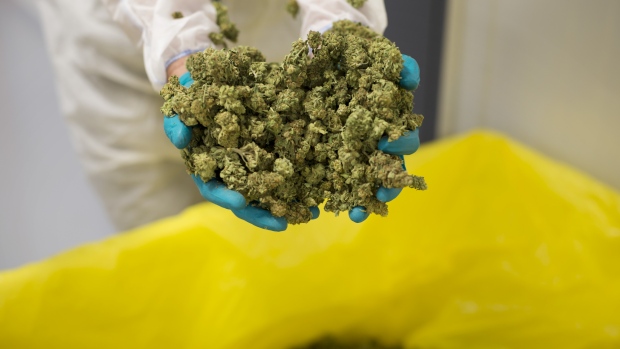Mar 28, 2019
CannTrust plunges after missing fourth-quarter estimates
, The Canadian Press

Shares of CannTrust Holdings Inc. (TRST.O) slipped more than 18 per cent after it reported a fourth-quarter revenue bump on the legalization of recreational cannabis in October but missed expectations and swung to a net loss.
In its first quarter to capture post-legalization recreational sales, the Vaughan, Ont.-based licensed producer reported record revenues for the three-month period ended Dec. 31, up 132 per cent from a year earlier.
CannTrust posted a fourth-quarter net loss of $25.5 million or 26 cents per share, compared to a $6.3 million profit or eight cents per share during the same quarter in 2017.
Analysts had expected revenues of $21.2 million, and a net loss of $6.4 million amounting to a four cent loss per share, according to Thomson Reuters Eikon.
CannTrust said its operating expenses rose during the quarter due, in part, to higher marketing costs to launch its recreational brands, personnel hires and costs related to its listing on the New York Stock Exchange.
For the full year, CannTrust reported net revenues of $45.6 million and a net loss of $13.6 million, compared to net revenues of $20.7 million and net income of $6.9 million in 2017.
"The CannTrust team made excellent progress on its strategic priorities in 2018, and this is evident in the record sales we have made to our patients and customers," said its chief executive Peter Aceto on a conference call with analysts on Thursday.
However, the cannabis company's stock tumbled after the release of its latest earnings.
On the Toronto Stock Exchange, CannTrust shares closed at $10.90, down 18.96 per cent from its previous close of $13.45.
Shares of cannabis companies were already lower in the aftermath of analyst downgrades of Cronos Group Inc., which reported its fourth quarter earnings on Tuesday. Like CannTrust, the Toronto-based licensed producer reported an uptick in fourth-quarter revenue but a quarterly net loss and higher operating expenses, falling short of analysts' expectations.
Cannabis companies had ramped up production in the lead up to legalization on Oct. 17, but both government and private retailers continue to face a supply shortage across the country. The low levels of product have prompted Quebec cannabis corporation stores to close on Mondays and Tuesdays and the Ontario government to limit the number of initial private retail licenses.
Earlier this month, the chief executive of HEXO Corp. said product has been slow to reach retailers because licensed producers "underestimated" the infrastructure to fulfill orders.
Aceto said on Thursday that adult-use legalization has been a "driver of growth" for CannTrust, but the "rollout has not been without its challenges for the company, its competitors and provincial distributors."
"For CannTrust in particular, we have had to train hundreds of new staff, absorb the cost of a much larger facility, and vigorously implement automation and process improvements, particularly related to product testing, quality assurance and product handling," he said.
As well, CannTrust is absorbing the cost of the excise tax applied to medical sales, which several other licensed producers have also opted to do.
However, the licensed producer expects its bottom line to improve with the Phase 2 expansion of its facility in Pelham, Ont., which is expected to increase CannTrust's production capacity to 50,000 kilograms on an annualized basis.
Construction on Phase 2 is complete, but the company is awaiting final licensing, the company said Thursday.
Greg Guyatt, the company's chief financial officer, said with this additional capacity up and running, CannTrust expects to be in the black by the "back half of the year."
"As the phase 2 expansion contributes to positive operating leverage, the company expects to return to profitability."
Cannabis Canada is BNN Bloomberg’s in-depth series exploring the stunning formation of the entirely new – and controversial – Canadian recreational marijuana industry. Read more from the special series here and subscribe to our Cannabis Canada newsletter to have the latest marijuana news delivered directly to your inbox every day.


